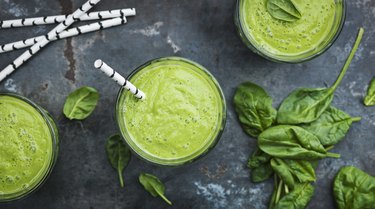
Running a half marathon is more than running 13.1 miles on the day of the race. This feat is the culmination of hours of training over several months. It's also the culmination of months of proper nutrition, so make sure you include a meal plan for half marathon training as part of your prep.
Training for a Half Marathon Diet
Video of the Day
Good nutrition is as much a part of half marathon training as regular runs. Your body needs quality fuel to get the energy needed to train for and race 13.1 miles. According to the Mayo Clinic, it's important to aim for the right combination of carbohydrates, protein and fat.
Video of the Day
You're going to need a lot of carbs, so this isn't the best time to go on a diet. The Mayo Clinic recommends 2.7 to 4.5 grams of carbs per pound of body weight each day. That's 365 to 607 grams of carbs if you weigh 135 pounds.
As Ohio State University's Wexner Medical Center notes, few people can perform well on a low-carb diet during endurance training. The key is to choose high-quality carbs like whole-grain bread, cereals, rice and pasta, along with starchy veggies and fruit.
Another way of fulfilling your body's carb needs when training for a half marathon is to make sure you're eating carb-rich foods each day. The American Council on Exercise (ACE) points out that high-quality carbs should comprise 55 to 65 percent of daily calorie intake when you're getting ready for a long-distance event.
You'll also need some protein and fats. Protein helps build muscle mass, so aim for about 0.6 to 0.8 grams per pound of body weight daily. That's about 81 to 108 grams for a 135-pound person. There's no recommendation for fat, but the Mayo Clinic recommends eating healthy fats like those in avocado, nuts, seeds and olive or canola oil.
Read more: Good Foods to Eat Before a Morning Run
Eat Right While Training
Your meal plan for half marathon training begins when you start your training routine, not the week before the race. During shorter runs that take 30 to 40 minutes, a balanced diet is usually a good plan, according to Colorado State University (CSU). But for those long runs of two hours or longer, increase your carbs to as much as 70 percent of your calorie intake.
You should eat more carbs because your muscles store glycogen, which is converted back to glucose during exercise and used as energy. For endurance events shorter than two hours, glycogen stores in your muscles may be enough. But if you're working your muscles hard for two hours or more, eating extra carbs in the days leading up to that intense effort can help.
Don't forget fluids either. Wexner Medical Center states that when you run for 45 minutes or more, you should be drinking a lot of water. Eating a high-carb, high-protein snack after a long run will help with recovery, points out the Mayo Clinic. Carbs help replace the muscle glycogen lost during training, while protein helps repair your muscles.
Read more: The Best Food to Eat the Night Before a Marathon
Strategies for Race Day
Make sure the food you eat before a race is similar to what you've eaten throughout your training. Try new foods early in your half marathon nutrition plan of 12 weeks or more, not in the days and hours before your race. Consider these meal ideas before the big day (or before a more intense workout):
- Hard-boiled eggs and wheat toast
- Peanut butter and banana with whole-grain crackers
- Whole-grain bagel with tomato and low-fat cheese
- Grilled chicken and wheat pasta
The American Council on Exercise states that high-fiber fruits and grains probably should be avoided in the hours just before a long run or race because they may cause stomach distress. At the same time, you want to take in a good balance of fluids and carbs during the race to offset any nutritional losses.
According to a review of distance running nutritional strategies in the March 2019 issue of the International Journal of Sport Nutrition and Exercise Metabolism, fluids become even more important during sports competitions in hot environments. If you follow a balanced diet and stick to your training plan, the results will pay dividends on race day.
- Mayo Clinic: "Fueling Strategies For Distance Runners"
- American Council on Exercise: "Nutrition Support for Long-Distance Running"
- Ohio State University Wexner Medical Center: "4 Nutrition Tips for Runners"
- Colorado State University Extension: "Nutrition for the Athlete"
- International Journal of Sport Nutrition and Exercise Metabolism: "Contemporary Nutrition Strategies to Optimize Performance in Distance Runners and Race Walkers"